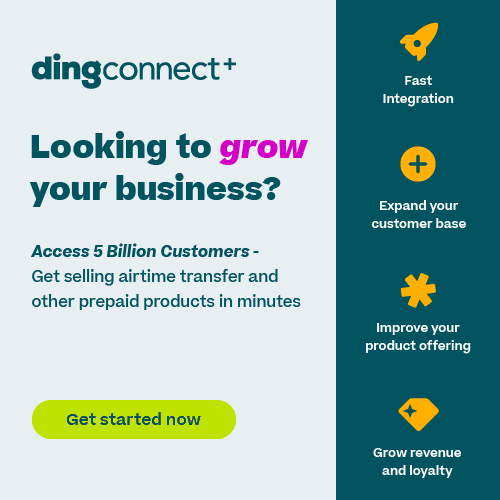
Three Reasons Why APIs Are Driving Fintech’s Stellar Growth
by Rupert Shaw, Chief Commercial Officer at Ding September 10, 2021Startup funding is currently flowing at an unprecedented rate, and fintech is turning out to be one of the biggest beneficiaries.
In the first quarter of 2021, Singaporean fintech startups saw a surge in funding of over 350% compared to the previous year, and Golden Gate Ventures has forecast that Southeast Asia will produce a record number of exits over the next few years, with fintech one of the most significant drivers.
The role of APIs in this rapid growth cannot be understated. If financial applications can be imagined as a vast sprawling city of skyscrapers, then APIs are the roads and rails that make it easy for citizens to move between them.
At Ding our API is used by partners all around the world to add international mobile recharge – which is the best value micro-value transfer option in the world.
Integration takes minutes and companies can be up and running selling airtime, which among other things has a very good entry point for the customer relationship, given the average acquisition costs and also allows partners to efficiently cross-sell customers on other remittance services.
It also helps to move an app towards more of a one stop shop – giving customers more of a reason to stay longer and buy more.
For fintech firms, failing to tap into the opportunities of APIs is akin to being one of the buildings out in the suburbs, detached from the transport network.
Sure, you may get a few visitors, but you’ll miss out on the vast amount of passing traffic that comes from being integrated as part of the network.
However, aside from virtual curb appeal, there are plenty of other benefits for firms adopting an API strategy.
1. Adaptability and Fast Innovation
A 2020 Google Cloud survey found that companies using API-first strategies reported faster innovation and greater value from business partnerships.
APIs give firms the ability to share their features and data with one another, meaning it’s easy to experiment and quickly bring new services to market without putting all the time and investment into building them in-house while also accessing a wider pool of customers.
With a integration with the Ding top-up API companies instantly gain access to a global customer base of 6 billion prepaid mobile users.
Furthermore, the ability to innovate rapidly and with low overheads means that a successful API implementation can start delivering a return on investment in a very short space of time.
In fact, revenue increases from API initiatives are estimated to be eighteen times higher than other digital initiatives.
Conversely, if something doesn’t work, there are significantly lower sunk costs, making innovation less risky.

2. Deliver a Seamless Customer Experience
APIs provide firms with the ability to give their customers a truly seamless experience. One example of this is the “super app,” which offers multiple products and services operating together via one user profile.
China’s WeChat is perhaps the best-known, and others are following suit. One example is Careem, a ride-sharing app that operates in 14 markets across the Middle East and Pakistan.
The company was acquired by Uber in 2019, having built up businesses in ride-hailing, food and grocery delivery, bicycle hire, and peer-to-peer money transfer.
Careem launched its super app in June 2020 and has seen a 900% increase in the number of customers using multiple services.
Ding is among several companies to have plugged into Careem’s super app via an API, which has enabled Careem to better retain customers.
Integrating APIs into a platform instantly enables companies to quickly and easily offer additional products and services.
This improves the overall service and experience for the customers by giving them an even greater range of services from within the one interface, including the sending of airtime or other purchases from this Careem Wallet as is the case with its partnership with Ding.
3. Fostering Collaboration
While a system of open banking inevitably promotes innovation, the trend towards using APIs also helps to foster collaboration between firms.
In an industry such as fintech, where the divide between “old” and “new” could have become adversarial, APIs provide a way for traditional financial firms and fintechs to work together.
A case in point is our recently announced partnership with Payit, the UAE’s first, fully-digital wallet powered by First Abu Dhabi Bank (FAB).
The partnership sees FAB become the first bank in MENA to offer mobile recharge to its customers, powered by DingConnect’s global mobile top-up API.
API partner programs may also offer benefits that go above and beyond the pure integration, providing opportunities for brand exposure or other cross-marketing efforts to new audiences.
Therefore, adopting an API strategy can also yield advantages that go beyond the face value of the collaboration.
In Ding’s case, as the #1 mobile top-up API provider, we pride ourselves on providing a simple API integration to enable our digital and retail partners to send mobilw top-up worldwide via their own websites and apps, giving them access to a global audience of six billion prepaid mobile customers, across 150 countries, while also helping more people from around the world to partake in the digital economy.
Fintech is a relatively new industry, and the onset of APIs and open finance is an even newer development.
However, they’re powering an unprecedented wave of innovation and funding and ushering in a new age of 24/7 mobile finance on demand.
If you would like to learn more about Ding international top-up API solutions and discuss business opportunities, send in your details here.
Featured image credit: Edited from Pexels







